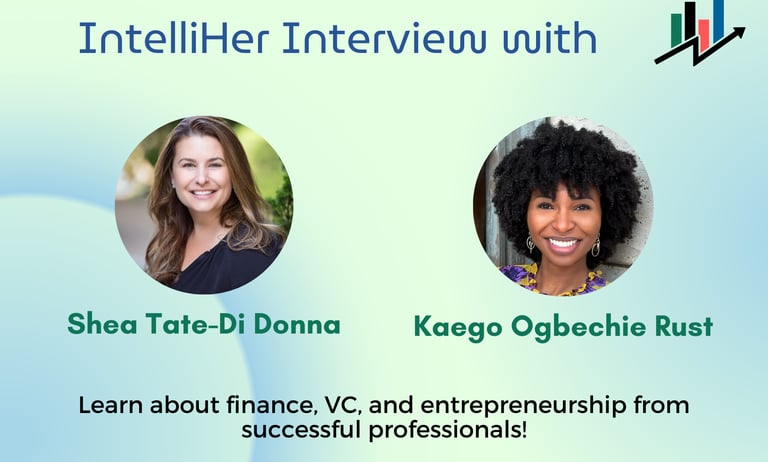IntelliHer Interview with Shea Tate-Di Donna & Kaego Ogbechie Rust
Check out our interview with Shea Tate-Di Donna & Kaego Ogbechie Rust about finance, entrepreneurship, and more!


Shea
Shea Tate-Di Donna is a career venture capitalist, entrepreneur, product creator, and author. With more than a decade of early-stage high tech venture experience, she has advised hundreds of emerging fund managers. Shea was part of the founding team at True Ventures, creator of Founder Services, and originator of Venture Productization.
Kaego
Kaego Ogbechie Rust is a career business advisor, entrepreneur, and author — with more than a decade of financial services experience in the public and private markets at Goldman Sachs and her consulting practice, Foresight Advisors, Kaego has worked with hundreds of companies in alternative investing, venture capital, private equity, small business, and startups.




1.What initially drew you to venture capital and entrepreneurship?
We were drawn to venture capital and entrepreneurship by the opportunity to work with hundreds of fund managers, helping them launch their funds from operations to fundraising to managing their portfolio. We saw a gap in the market for best in class operational knowledge, tangible examples, and real peer advice in areas like building pitch decks, fundraising, operations, and legal matters.
2. What advice would you give students who are interested in pursuing venture capitalism and entrepreneurship as a job?
If you are interested in pursuing venture capital and entrepreneurship, here are a few key pieces of advice:
Talk to as many people working in the industry as you can; there is no substitute for hearing firsthand experiences from those already living the life that you are aspiring to, and their insights will be invaluable.
Focus on building genuine relationships and always follow through on your commitments. The venture capital and startup world has a strong pay-it-forward culture, so look for ways to provide value to others before seeking anything in return, which applies to both potential investors and the companies with which you may work.
Be your authentic self and follow your true passions; if you are deeply interested in an area like climate change or sustainability, bring that enthusiasm to your venture pursuits. Your genuine excitement will come across much more powerfully than trying to fit some preconceived mold.
Remember that success in this field is a long game. Be prepared to put in the work to gain practical experience across all aspects of fund management. Building a strong network takes time, so start cultivating those relationships early.
Brace yourself for challenges, particularly when it comes to fundraising if you choose to raise your own fund ~ persistence and resilience are key.
Focusing on authenticity, relationships, and continual learning will well position you to make your mark. It can be a rewarding path for those willing to put in the effort!
3. What are some key qualities or skills you believe one must have in order to succeed in this field?
To succeed in venture capital and entrepreneurship, several key qualities and skills are crucial:
Vision & Anticipation ~ The ability to spot trends and identify promising opportunities before they become obvious to everyone else, which involves a mix of analytical skills and intuition honed through experience.
Risk Tolerance ~ Early-stage investing is inherently risky, so it is necessary to be comfortable with uncertainty and potential failure while still making calculated decisions.
Network Building ~ The ability to build and maintain a strong network of entrepreneurs, industry experts, customers, talent for building teams, investors, and other stakeholders is invaluable.
Financial Acumen ~ A solid understanding of financial modeling, valuation methods, and market dynamics is helpful when evaluating potential investments.
Empathy & Emotional Intelligence ~ Understanding and connecting with entrepreneurs on a personal level can give you an edge in deal-making and supporting portfolio companies.
Adaptability ~ The startup world moves fast, requiring the ability to pivot quickly and adapt to new information or changing market conditions.
Pattern Recognition ~ The skill to identify common traits in successful startups and apply those insights to new opportunities.
Decisiveness ~ The ability to make tough decisions quickly, often with incomplete information.
Communication skills ~ Being able to articulate your vision, persuade others, and provide clear feedback is key in all aspects of the job.
Curiosity & Continuous Learning ~ The tech and business landscapes are always evolving; bring a genuine interest in new technologies and business models combined with a commitment to ongoing learning.
Resilience ~ The ability to bounce back from failures and setbacks, which are inevitable in this field.
Strategic Thinking ~ Understanding how pieces fit together in the bigger picture, both for individual startups and the broader market.
Patience ~ Many investments take years to pay off, so the ability to think long-term and not get swayed by short-term fluctuations is important.
Ethical Judgment ~ As you will often be dealing with other people's money and dreams, a strong moral compass is crucial.
While one person may not excel in all these areas, the most successful venture capitalists and early-stage investors typically possess a strong combination of many of these qualities and skills. Surround yourself with teammates and colleagues that complement your strengths and offset your weaknesses.
4. What is the most significant challenge you faced and how did you overcome it?
It is crucial to reframe how we think about challenges and failure. Instead of seeing it as a daunting hurdle or a dead end, view it as a key part of the learning process. It is like applying the scientific method to business ~ form a hypothesis, test it, and learn from the results, whether they are what you expected or not.
The key is to fail early and fail fast. As IDEO founder David Kelley famously said, “fail faster to succeed sooner.” That way, you can quickly move on to the lesson and apply what you have learned to your next venture. Focus on iteration, improvement, and moving forward.
One of the biggest hurdles was learning not to take failure personally. It is easy to let it hit you right in the heart, but it is much more productive to step back and ask, "What can I learn from this?" Every setback became an opportunity to gather invaluable data and insights.
So, how have we overcome these challenges in our careers? By embracing failure. Celebrate the lessons learned from each setback, which will lead to more resilience, more adaptability, and ultimately, being a better investor and entrepreneur. When faced with a new challenge, approach it with curiosity rather than fear. Ask yourself, “What will this experience teach me? How can I use this to grow and improve?” It is this mindset shift that has not only helped us overcome our biggest challenges but has also paved the way for our greatest successes.
Remember, in the world of venture and entrepreneurship, failure is not the opposite of success - it is part of the journey towards it!
5. What has been the biggest lesson you have learned in your career?
Knowledge sharing and mutual support are incredibly powerful. There is a collaborative ecosystem where we all grow together, with experienced GPs often willing to share practical insights you cannot get from textbooks. By openly exchanging experiences and making it easy for others to help us, we collectively raise the bar for the entire industry, leading to better outcomes for everyone involved.
6. How do you think the future of venture capital will change in the next decade?
We are going to see a group of fund managers entering the field with a much more broad diversity of intellect. This is not just about fairness - it is about bringing fresh perspectives and innovative ideas to the table. Different backgrounds and experiences can lead to spotting opportunities others might miss.
We are also likely to see a sharper focus on operational excellence in fund management. As the industry matures, there is going to be more pressure to run these funds like well-oiled machines, not just rely on a few big hits.
We will see stronger alignment between general partners and limited partners, centering around shared values and desired impact, alongside the pursuit of meaningful returns. It is not just about the money anymore - investors are increasingly looking to make a positive difference in the world.
We will continue to see fund managers doubling down on providing value beyond just capital. The best funds are already acting more like partners than just checkbooks, offering expertise, connections, and strategic guidance. This trend is only going to grow stronger.
7. What are some opportunities available for high school students who are aspiring to become an entrepreneur in the future?
If you are a high school student dreaming of becoming an entrepreneur, there are so many exciting opportunities to start building your skills right now. Joining an investment club or participating in Model UN can be fantastic for developing crucial skills like public speaking, pitching ideas, and working in teams. You might also want to look into coding classes or programs specifically designed to introduce young people to the world of venture capital, like Girls Into VC and Girls Who Invest. These experiences can help you develop the leadership, conflict resolution, and communication skills that will be invaluable in your future entrepreneurial journey.
You can also learn about the fundamentals of business and finance - there are tons of great online resources and books to get you started. For example, 1517 Fund, an anti-establishment educational institution and VC firm backing founders at the earliest stages of their careers and companies, has put together a great reading list. Try to connect with local entrepreneurs who might be willing to mentor you or let you shadow them. Look for entrepreneurship programs or competitions in your area - these can be great opportunities to test your ideas and meet like-minded peers.
Start small and stay true to yourself. Launch a mini-business or project; even if it is just mowing lawns or selling crafts online, you will learn about customers, profit and loss, and more. There is no substitute for that hands-on experience of running your own show, no matter how small. What do you care about? Focus there. When you are passionate about your work, those long hours fly by because you are driven by genuine excitement and purpose, making the journey as rewarding as the destination. Remember, every big entrepreneur started somewhere, and high school is the perfect time to begin laying the groundwork for your future success!
8. With your extensive experience in venture capital and product creation, can you share an example of a successful "venture production" strategy that you have implemented, and what were your key takeaways from that experience?
In my journey as a venture capitalist, I have had the opportunity to pioneer what I call "Venture Productization" ~ a strategy that goes beyond just providing capital to actively support and develop our portfolio companies. One of the most successful implementations of this approach involved becoming deeply embedded with a promising startup facing growth challenges. We made it clear that we wanted to be their first call in both good and bad situations, and this paid off when they reached out during a critical pivot. By offering hands-on support, from refining their product strategy to making key introductions, we helped them navigate a tricky phase and ultimately achieve significant success. This experience really drove home for me the importance of finding ways to add value throughout the entire investment lifecycle. It is not just about the initial funding - it is about being a true partner and resource at every stage of a company's growth. This approach has not only led to better outcomes for our portfolio companies but has also strengthened our reputation and deal flow in the startup ecosystem.
9. How do you stay ahead of the curve in terms of current industry trends, technological advancements, and changing market conditions?
To stay ahead of the curve and keep your finger on the pulse of the industry through constant engagement and learning, I make it a point to actively connect with my network of fund managers and entrepreneurs regularly. These conversations are gold mines of information - you get real-time insights into what is happening on the ground, often before it becomes widely known. I also love diving into new sectors and working with fresh startups and funds. It is like being on the frontier of innovation, and it keeps me on my toes, always learning and adapting.
It is not just about networking, however. I am a big believer in continuous research and analysis. I carve out time each week to dive deep into market trends, emerging technologies, and shifting consumer behaviors. It has been incredibly valuable to participate in and even organize knowledge-sharing events and collaborations. There is something magical about getting a bunch of smart, passionate people in a room (or on a video call) to exchange ideas. It is all about cultivating curiosity and putting yourself in environments where you are constantly challenged to grow and learn. I think the moment you stop trying new things or challenging yourself is the moment you start falling behind. I consistently push myself out of my comfort zone, whether it is exploring a new tech domain or tackling a complex market challenge. It is this mindset of continuous growth and learning that really helps me stay ahead of the curve.
10. Could you describe a particular memorable and impactful success story from your work with founders, and what made qualities made your ideas stand out?
Based on our experience building a venture lending marketplace exchange, a particularly memorable and impactful success story involved working with a specific startup. We were able to connect them with a venture debt lender, resulting in a $5 million term sheet - significantly more capital than they likely would have accessed through traditional channels. What made this match stand out was how well it aligned with our goal of providing founders access to more capital, better terms, and industry expertise. The founder was thrilled with the outcome, as it allowed them to accelerate their growth plans. This success highlighted the value of our smart-matching algorithm and demonstrated how CapitalMap could be a game-changer for both startups seeking capital and for the organization in deepening client relationships. It was especially rewarding to see how our service could make a tangible difference in helping an innovative company move forward with their mission.

